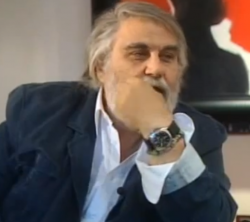 Gonzo MultiMedia UK has announced that it will release a new feature length documentary on Greek music legend Vangelis on September 23, 2013.
Gonzo MultiMedia UK has announced that it will release a new feature length documentary on Greek music legend Vangelis on September 23, 2013.
Vangelis And The Journey To Ithaka includes interviews with Vangelis and many of his friends and colleagues, including Sean Connery, Hugh Hudson, Jessye Norman, Oliver Stone, Akiko Ebi, Julian Rachlin and others. It also includes rare, historical footage, most of which has never been seen before and recent footage of Vangelis improvising new music.
Here is a preview of Vangelis and the Journey to Ithaka:
Vangelis is best known for his Academy Award winning score for the film Chariots Of Fire, and composing scores for the films Antarctica, Blade Runner, 1492: Conquest Of Paradise and Alexander, as well as the use of his music in the PBS documentary Cosmos: A Personal Voyage by Carl Sagan.
Vangelis began his professional music career working with several popular Greek bands in the 1960’s, such as The Forminx and most notably Aphrodite’s Child. Throughout the 1970’s Vangelis composed music scores for several animal documentaries; the success of these scores brought him into the film scoring mainstream.
In the early 1980’s, Vangelis teamed up with YES vocalist/songwriter Jon Anderson. The duo recorded a series of successful and critically acclaimed albums under the name Jon & Vangelis. In 1981 Vangelis composed the score for the Oscar-winning film Chariots Of Fire, which won him an Academy Award for Best Original Music Score. The soundtrack’s single “Theme From Chariots Of Fire” reached the top of the American Billboard Hot 100 chart and was most recently used as theme music at the London 2012 Olympics.
See the Gonzo MultiMedia UK site for more information.

The Master!!!! 🙂
Hmm…music is a language? I don’t agree with this. If its a language then write me some music that specifically tells me something.
Do Re Mi Do Re Do.
It not something to agree with, it is true, just as mathemathics is a language.
That you dont know the language doesnt mean its not a language, it just means youre ignorant.
They are means of expression with clear rules and common interpretation used to describe what we perceive.
You have it backwards, or at least sideways. Music almost never tells you something specific; its up to YOU to decide what its saying. A pop song with topical lyrics or a military revue are examples of exceptions, but in the broader world of it, what it triggers in your mind can easily be very different from the effects on the next 50 people. If its really worth its salt, it’ll reward you for digesting it over several listenings. I prefer music that takes some effort to embrace, rather than being so simple, it melts like Cap’n Crunch in hot cream on the first listen.
If you’re looking to nail music that narrowly, then you’re putting your effort in the wrong place. Vangelis’s soundtrack “L’Apocalypse de Animaux,” is totally evocative, but not at all specific. I’ve listened to it dozens of times and I’m still idly fishing for his mood while writing it. He also says that he custom-tortured the innards of an organ to get those sustaining tones out of it, which ultimately fried it. So how do you mesh
the great music, the nature film that applied it and his technical leap of faith in modding his own instrument? Don’t tell me, I want to pursue my own abstracted little take on it! 😛 A lot of people try to emulate him, but its largely because he set such a high standard for romantic music that still has balls.
So the conclusion is that Bitbin is right? Music is not a language.
At least not in the common sense of the word.
That of course doesn’t prevent music from being communication which probably is what Vangelis means anyway.
Mathematics too is not a language in the common sense of the word. It’s a trivializing over simplification to call mathematics a language.
Vangelis is in fact…………The Man!!!